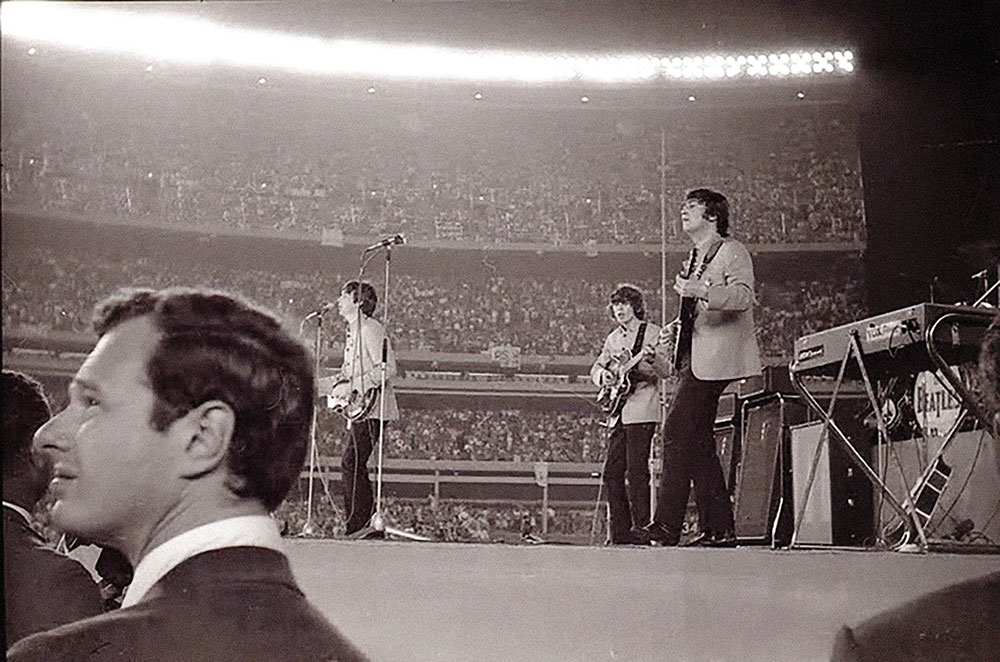Velvet Mafia, the gay community that unleashed the 1960s pop culture
- In our poptial imaginary, the irrational behaviors that the melody and rhythms of the male rock groups of the 1960s produced in the female audience were radically based: the wild guts, the primitive body tremors, the frenetic dance and the dizziness caused by the frenzy of sex. However, the general public knows very little that behind the famous bands of teenage boys who represented the pop explosion that emerged in England and that was exported to the United States and to Europe there were several gays. Precisely the gays modeled the phenomenon of the Swinging London (the London Festival), a scene of fashion and culture that flourished in London in the 1960s, a colorful and hedonistic explosion that then spread across the globe, overtaking the West. Likewise, those gay businessmen of culture built a strong support network to help each other, to make the entire cultural industry dependent on them and, finally, to fill the pockets with sosas expended by teenage amateurs.

Darryl W LGBTQ expert. The English author Bullock gathers the story and stories of a gay collective based on friendship, Velvet Mafia. The gay men who ran the swinging sixties. Gays began the holidays of the 1960s). This velvet mafia consisted, among others, of the following men: Beatles group manager Brian Epstein, entrepreneur Larry Parnes, band manager The Who Kirt Lambert, record producer Joe Meek, record manager EMI Joseph Lockwood, manager Bee Gees and Cretonam Pittont Stigwood, and musician's house Board-Board-David. The story begins in the 1950s, with the first rockers imported from EE.UU. And created in England, and it extends through the 1970s, in the light of the glam movement's glam glam shiny, androgynous beams.
The sexual activity of the powerful gay men occurred in secret, as homosexuality in the United Kingdom did not decriminalize until 1967. As a result of this administrative constraint, entrepreneurs benefited from the young stars that were under their protection to heat sheets and hearts. However, as highlighted by the author of the book, the main objective of managers, producers and seasonal record owners was to enrich them to the fullest. “It’s very important that people understand that LGBTQ people were not just part of what gave rise to today’s rock culture, but were the driving force behind it. They were people who pushed things forward. Those who were looking for the last thing to start the cultural revolution,” explains Darryl W. Bullock in the Guardian newspaper.
However, the musical trajectories of some newborn stars ended violently by refusing to have sex, such as the pioneering music company Larry Parnes, which had replaced young stars with very conflicting relationships, offered them great help to channel their creativity and succeed, but also exploited them economically and sexually. Parnes tried to lie down with young rock boys, even if they were minors. So did Brian Epstein and Robert Stingwood. “They had a totally immoral side,” but as their main goal was to make sosas, many stars developed long and successful routes, thanks to the acceptance often of being treated violently. In return, musicians received great artistic support from the best managers. In many cases there was a relationship of total trust, such as that of Kit Lambert and the leader of The Who, Pete Townshend, a manager who used all his artistic and musical knowledge for the guitarist to perform the historic opera Tommy rock.
Tragic endings
In this context, with the coins and fame raging, some of these prestigious and powerful professionals experienced terrible deaths. They were persecuted for their sexuality and, as a consequence of this suffering, some also took the conscious path of death. Joe Meek, an innovative producer, committed suicide in 1968: he entered the study's cockpit, tried to get his owner out of the study, and after a strong discussion he shot him in his back and then committed suicide with the same weapon on the day of the anniversary of Buddy Holly's death on February 3. But before, Meek was arrested by police for having sex with a man in public toilets. The event had a major impact on the press. “That event set things in motion to commit suicide,” Darryl W. According to Bullock. Ironically, when homosexuality was decriminalized in the Great Kingdom in 1967, persecution towards homosexuals increased.
In addition, many of the velvet mafia were gay and Jewish. As a result of this dual identity, there were strong conflicts in men's brains. Proof of this is Brian Epstein, famous manager of the Beatles, fifth beatle. “With all this they fought passionately [Epstein],” says Darryl W. Bullock. He was a self-destroyer, a drug addict, who lived in the melancholy to which they suffered unfortunate and painful love. He was beaten and blackmailed by the men. Plunge into affective chaos. He died in 1967 from barbiturate overdose. After Epstein's death, John Lennon confesses that the Beatles group was about to end. “There I realized we were in trouble,” Lennon said in 1970. The lives of four musicians and millions of people in Liverpool were transformed by the Beatles manager, who in turn revolutionized the history of pop and rock forever.
It also highlights the end of Kit Lambert, a bloody event: In the late 1960s, he drowned in alcoholism and died a decade later due to cerebral hemorrhage caused by the beating of a camel.
According to Bullock, the new scene created and driven by these men, along with the festive, was fundamental to change the taboos, and the Velvet Mafia. Through his book The gay men who ran the swinging sixties wanted to recognize them for their contribution. Although it is not well-deserved recognition, the British writer has revealed that behind pop and rock culture a silent LGBTQ community was hidden.
No women's fingerprint
Bullock doesn't care for women at work. “That’s how things were at the time. At that time, women had to stay at home and raise children.” However, in the 1960s, in the British rock and pop scene there were a few powerful lesbians, even though the writers were not picked up in their book, such as the producer Vicki Wickham, who brought the groups who participated in the pioneering TV program on pop music, Ready Steady Go. Wickham is a lesbian, but she believes that sexuality has never been a problem for her. “In the 1960s, I didn’t come out of the closet. I didn't know what it really was. Everyone knew I was a lesbian, but we were so politically unconscious.” Wickham conducted a prominent career as a manager, ruling the careers of artists like Dusty Springfield or LaBelle. Both female artists. Springfield, born in London, recorded in 1969 the classic soul album titled Dusty In Memphis, in the American city of Memphis. LeBelle, on the other hand, was the soul and album group formed in 1970 by the musician Patti LaBelle, who in 1975 recorded the famous hit Lady Marmalade.
Negu-usaina nabari da Gasteizen. Aire hotza, aire freskoa eta, batik bat, aire berria. Montaukek bigarren diskoa argitaratu du, Geruzak. Beñat Goitiak geruza askoz betetako lan hotz eta trinkoa dela dio. Igartzen da, eta badakigu: iritsi da negua.
Zazpi kantako lan bat, aurrekoaren aldean trinkoagoa dirudiena, disko osoak eduki behar zuen tonua argi daukan talde baten emaitza. Garapen luzeak dira Montauken etxeko marka, Geruzak-eko kanta pare bat besterik ez daude bost minututik behera.




















